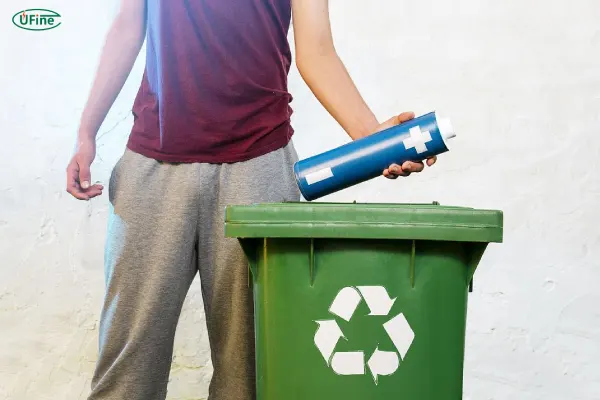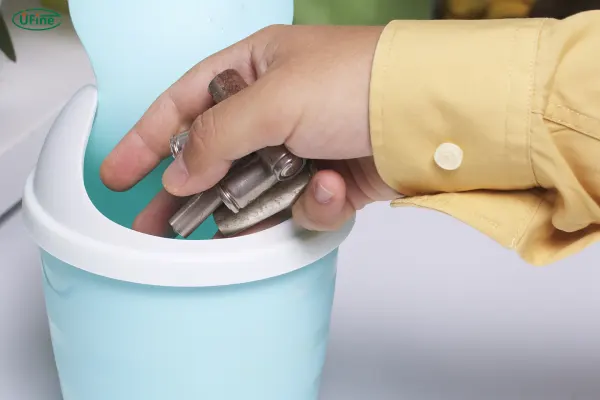
- Part 1. Why battery disposal is a serious issue
- Part 2. Different types of batteries: not all are the same
- Part 3. Can you throw away alkaline batteries?
- Part 4. Can you throw away lithium batteries?
- Part 5. Legal regulations around battery disposal
- Part 6. What happens if you throw batteries in the trash?
- Part 7. How to dispose of batteries safely
- Part 8. How to store dead batteries before disposal
- Part 9. Battery recycling vs disposal: what's the difference?
- Part 10. What to do with damaged or swollen batteries
- Part 11. Tips to reduce battery waste
Different types of batteries contain different chemicals, and not all of them are safe for regular trash. Some can leak toxic substances. Others can spark fires. And in many places, tossing them in the garbage is actually illegal.
This article breaks down everything you need to know about safe battery disposal, including what types can be thrown away, which must be recycled, and what the law says about it.
Part 1. Why battery disposal is a serious issue
Batteries may look small, but they can cause big problems. Most batteries contain heavy metals and corrosive materials like lead, mercury, cadmium, and lithium. When dumped into landfills, these substances can:
- Leach into soil and groundwater
- Harm wildlife and ecosystems
- Pollute the air when incinerated
- Pose serious fire risks in garbage trucks and recycling facilities
As battery usage rises, improper disposal has become a major environmental concern. That’s why many governments and environmental groups are pushing for better public awareness and stricter battery recycling practices.
Part 2. Different types of batteries: not all are the same
Before you toss your old batteries, it’s important to know what type they are. Different batteries require different disposal methods:
- Alkaline batteries (AA, AAA, 9V, etc.)
- Lithium-ion (Li-ion) and Lithium-polymer (LiPo) batteries
- Nickel-Cadmium (NiCd) and Nickel-Metal Hydride (NiMH)
- Lead-acid batteries (used in cars and solar systems)
- Button cell batteries (watches, hearing aids, calculators)
Let’s explore what to do with each.
Part 3. Can you throw away alkaline batteries?
In many countries, alkaline batteries can legally be thrown away in regular trash. That’s because most modern alkaline batteries no longer contain mercury, making them less hazardous than older versions.
However, recycling is still better.
- Alkaline batteries contain zinc, manganese, and steel—materials that can be recovered and reused.
- Check local recycling centers or battery drop-off programs (e.g., Home Depot, Best Buy).
Important: Some U.S. states like California classify all batteries as hazardous waste, even alkaline. So always check your local rules.
Part 4. Can you throw away lithium batteries?
No. You should never throw lithium batteries in the trash.
Lithium-ion and lithium-polymer batteries power smartphones, laptops, e-bikes, drones, and more. They are lightweight and efficient—but they can also be dangerous when damaged or punctured.
Risks of improper disposal:
- Fire hazards: Lithium batteries can short-circuit and ignite.
- Toxic exposure: They contain flammable electrolytes and heavy metals.
- Environmental harm: Improper disposal leads to pollution and wasted resources.
Always take lithium batteries to a certified recycling center or household hazardous waste collection site.
Part 5. Legal regulations around battery disposal
Battery disposal is more than just a safety issue—it’s a legal matter, too. Regulations vary depending on country, state, and battery type. Here’s a breakdown of the most relevant laws.
United States Regulations
Federal Level
- Resource Conservation and Recovery Act (RCRA): Regulates hazardous waste, including many types of batteries (e.g., lead-acid, NiCd, lithium).
- Universal Waste Rule: Makes it easier for businesses and consumers to recycle batteries. Covers:
- Nickel-cadmium
- Lithium
- Lead-acid
- Button cell batteries
State Level
- California: One of the strictest states.
- All batteries are considered hazardous waste.
- Residents must take used batteries to approved collection or recycling points.
- Fines for non-compliance can exceed $1,000 per violation.
- Minnesota, New York, Maine: Also have mandatory battery recycling laws.
Call2Recycle Program
- A national, voluntary battery recycling program accepted by retailers like Home Depot, Lowe’s, Staples, and others.
- Accepts rechargeable batteries and cellphones.
European Union
EU Battery Directive (2006/66/EC)
- Prohibits landfilling or incinerating batteries.
- Requires:
- Separate battery collection
- Manufacturer take-back programs
- Proper labeling and consumer education
WEEE Directive (Waste Electrical and Electronic Equipment)
- Regulates e-waste, including embedded batteries in electronics.
- Producers are responsible for the cost and logistics of recycling.
EU member countries have adopted this directive into national law with varying enforcement levels. In Germany, France, and the Netherlands, recycling batteries is mandatory.
Canada
- Battery recycling is governed by provincial regulations.
- Ontario: Extended Producer Responsibility (EPR) program requires producers to fund recycling.
- British Columbia: Enforced under the Recycling Regulation.
- National programs like Call2Recycle Canada offer drop-off points at major retailers.
Other Countries
- Australia: National Battery Stewardship Scheme (BSS) promotes safe battery collection and recycling.
- Japan: Requires collection and recycling through manufacturer-led systems.
- China: Recent regulations target improper disposal and encourage public drop-off points, especially for lithium and lead-acid batteries.
Part 6. What happens if you throw batteries in the trash?
Throwing batteries in the garbage might seem harmless, but the consequences can be serious:
- Landfill fires caused by lithium batteries
- Groundwater contamination from leaking chemicals
- Hazardous exposure for sanitation workers
- Legal penalties in regulated regions
Fire departments and waste facilities report a growing number of fires linked to battery disposal—especially lithium batteries tossed in regular bins.
Part 7. How to dispose of batteries safely
Here are safer, legal ways to dispose of your batteries:
- Retail drop-off bins at stores like Best Buy, Staples, Home Depot.
- Local hazardous waste collection centers—check your municipality’s website.
- Battery recycling programs (e.g., Call2Recycle).
- Manufacturer take-back programs for phones, laptops, and tools.
- Mail-in services offered by specialized recyclers.
Part 8. How to store dead batteries before disposal
Don’t toss used batteries into a drawer or shoebox. Follow these tips for safe storage:
- Use a plastic container (non-metal).
- Tape the terminals of lithium or 9V batteries to prevent short circuits.
- Store in a cool, dry place, away from flammable materials.
- Don’t store damaged or swollen batteries—dispose of those immediately at a hazardous waste facility.
Part 9. Battery recycling vs disposal: what’s the difference?
Recycling means extracting usable materials like lithium, cobalt, steel, and plastic for reuse. It reduces pollution and conserves resources.
Disposal, in contrast, often means sending to a landfill or incinerator, where the battery’s contents become environmental hazards.
Battery recycling is:
- Safer
- More sustainable
- Often required by law
Part 10. What to do with damaged or swollen batteries
Swollen batteries are dangerous and should never be thrown away. Here’s what to do:
- Don’t puncture or crush the battery.
- Place it in a fireproof container (metal box or sand).
- Take it to a hazardous waste collection facility immediately.
- Do not mail damaged batteries unless the service is certified to handle them.
Part 11. Tips to reduce battery waste
Reducing your reliance on single-use batteries makes a big impact. Here’s how:
- Switch to rechargeable batteries (NiMH or Li-ion).
- Use smart chargers to avoid overcharging and extend battery life.
- Recycle old electronics with embedded batteries.
- Choose energy-efficient devices that require fewer battery changes.
Related Tags:
More Articles

A Comprehensive Guide to Air Purifier Battery
Learn how to choose the right air purifier battery by comparing battery types, lifespan, and selection criteria for portable and industrial air purifiers.
10 Popular LiFePo4 Battery Price Comparison 2026
Find the most affordable option with the best features and warranty. Top 10 LiFePO4 price comparisons will help you choose your perfect LiFePO4 battery.
The Ultimate Guide to 12V 100Ah Lithium Battery
Learn what a 12V 100Ah lithium battery is, its specs, advantages over lead-acid, and common uses in RV, marine, and solar systems.
Group 31 Battery Size, Dimensions & Types Complete Guide
Learn everything about Group 31 batteries – dimensions, weight, types, and which battery is best for marine, RV, or industrial use.
Top 10 Lightweight Car Battery Options for Enhanced Performance
Compare the top 10 lightweight car batteries for 2026. Explore lithium, LiFePO4, and AGM options by weight, CCA, lifespan, and real-world applications.




